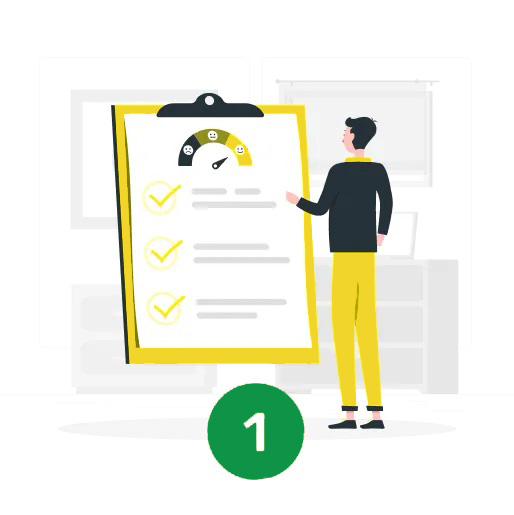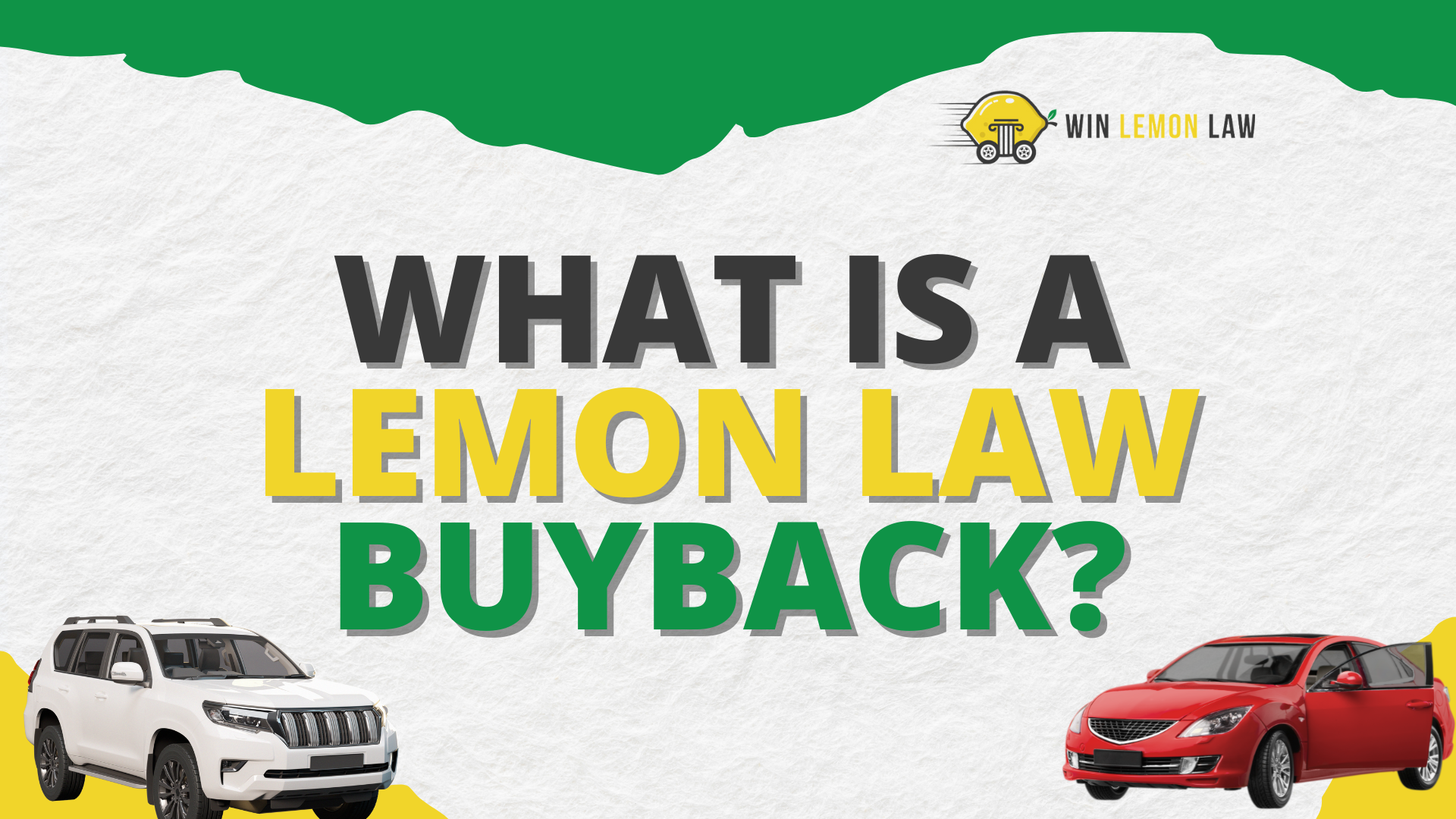If you’ve recently discovered that your vehicle qualifies under California’s lemon law, it’s crucial to understand the steps involved in pursuing a lemon law buyback. This process can be challenging, but with the right information and legal assistance, you can ensure your rights are protected. In this guide, we’ll walk you through the criteria for a vehicle to be considered a lemon, the two possible outcomes – replacement or buyback – and dive into the details of the California Lemon Law buyback program.
What Qualifies as a Lemon?
Under California lemon law, your vehicle may be considered a lemon if it meets the following criteria:
- Covered under warranty when the defect was reported.
- One or more defects substantially impairing use, value, or safety.
- Reasonable attempts for repair by a manufacturer-certified facility or 30 cumulative days out of service.
Lemon Vehicle Replacement Policy

- A replacement is optional for both the manufacturer and the consumer.
- Both parties must agree on the terms for a replacement to occur.
- The manufacturer may replace the defective vehicle with a new, identical one or provide a replacement of the same value.
- Collateral fees, legal fees, and associated costs must be covered by the manufacturer.
California Lemon Law Buyback Guidelines
What is a Lemon Law Buyback?
A California lemon law buyback refers to a vehicle that the manufacturer repurchases after the resolution of a lemon law dispute. Once the manufacturer repurchases the vehicle, they are obligated to pay the consumer the “lemon law buyback amount.”
Buyback Amount Calculation:
The lemon law buyback amount is a sum determined based on various factors specified in lemon law claims. The manufacturer is required to include several components in this amount, ensuring fair compensation for the consumer:
- Down Payment, Monthly Payments, and Remaining Loan:
The manufacturer must reimburse the down payment made for the vehicle, along with the monthly payments already paid by the consumer. Additionally, the remaining balance on the loan, if any, is part of the buyback amount.
- Transportation Charges:
Any transportation charges incurred by the consumer when purchasing the vehicle are the responsibility of the manufacturer. This includes costs associated with getting the vehicle to the consumer.
- Manufacturer-Installed Items and Charges:
The manufacturer is obligated to cover charges related to manufacturer-installed items or those installed by an authorized dealership. This encompasses items that are part of the vehicle’s original specifications.
- Sales Tax, Registration Fees, Licensing Fees, and Official Charges:
The manufacturer must reimburse the consumer for sales tax, registration fees, licensing fees, and all official charges paid during the initial purchase of the vehicle.
Lemon Law Buyback Formula:
Purchase Price of the Vehicle – Usage Fee = Lemon Law Buyback Value
Usage Fee:
Usage Fee = (Miles Driven/Statutory Average Life of Vehicle) X Price You Paid for the Car
Coverage for Incidental Damages
Incidental Damages:
Incidental damages refer to additional costs and losses that a consumer may incur directly as a result of owning a lemon vehicle with defects. These damages go beyond the immediate repair or replacement of the defective vehicle and encompass a range of financial burdens imposed on the consumer due to the vehicle’s shortcomings.
Types of Incidental Damages:
- Towing Fees:
If the lemon vehicle breaks down or becomes undrivable due to defects, the consumer may incur towing fees to transport the vehicle to a repair facility. Lemon law mandates that manufacturers cover these towing expenses as part of the incidental damages.
- Rental Car Expenses:
When a lemon vehicle is undergoing repairs, consumers often need alternative transportation. The cost of renting a car during this period is considered an incidental damage and is expected to be reimbursed by the manufacturer.
- Repair Costs:
Beyond the expenses covered in the lemon law buyback amount, additional repair costs resulting from defects and subsequent attempts to fix them are considered incidental damages. This includes costs for parts, labor, and any other repair-related expenses.
- Prepayment Penalties:
If the consumer financed the purchase of the lemon vehicle and had to pay off the loan early due to persistent defects, any prepayment penalties incurred become part of the incidental damages.
- Earned Finance Charges:
Consumers who financed their vehicle and paid interest on the loan may be entitled to reimbursement for earned finance charges. This accounts for the interest accrued on the loan amount before the vehicle was deemed a lemon.
- Early Termination Charges:
If the consumer had to terminate a lease or financing agreement prematurely due to the lemon designation, any early termination charges or penalties imposed by the financing institution become part of the incidental damages.

Importance of Documentation
To successfully claim coverage for incidental damages, meticulous record-keeping is crucial. Consumers should retain all relevant paperwork, invoices, and receipts related to the vehicle’s defects, repairs, and associated costs. This documentation serves as evidence in the lemon law claim process and strengthens the consumer’s case when negotiating with the manufacturer.
Navigating the Lemon Law Claim Process for Incidental Damages:
- Record-Keeping:
Maintain a comprehensive record of all expenses related to the lemon vehicle, including towing receipts, rental car agreements, repair invoices, and any other documents reflecting incidental damages.
- Consultation with Lemon Law Attorney:
Seek the advice of a lemon law attorney who can review your documentation, assess the validity of your incidental damages claim, and guide you through the legal process.
Inclusion in Lemon Law Claim:
When filing a lemon law claim, ensure that incidental damages are clearly outlined, and all supporting documents are provided to the manufacturer or during legal proceedings.
Negotiation and Settlement:
During negotiations with the manufacturer, your attorney will advocate for fair compensation that includes reimbursement for all incidental damages. This may be part of the overall settlement reached between the parties.
Steps to Navigate the Lemon Law Buyback Process
- Contact a California Lemon Law Attorney:
A reputable attorney will offer a free consultation to determine the validity of your claim.
- File the Claim:
Your attorney will gather necessary documentation and draft buyback terms.
- Negotiate with the Manufacturer:
Negotiations can be challenging, but an experienced attorney can counter manufacturer tactics.
- Collect the Buyback:
Once a settlement is reached, the manufacturer pays the buyback amount.
Speeding Up the Process

- Promptly Seek Legal Assistance:
As soon as you suspect that your vehicle may qualify as a lemon, it’s advisable to consult with a qualified lemon law attorney. A legal professional experienced in lemon law cases can provide insights into the strength of your claim and guide you through the necessary steps.
- Thoroughly Document Issues:
From the moment you start experiencing defects, meticulously document each issue, repair attempt, and related communication with the manufacturer or dealership. Detailed records significantly strengthen your case and provide a clear timeline of the ongoing problems.
- Promptly File a Lemon Law Claim:
Once you’ve consulted with an attorney and gathered all necessary documentation, promptly file a lemon law claim. Delays in initiating the process can prolong the resolution, and the sooner the manufacturer is aware of your intent to pursue a lemon law buyback, the quicker they may be motivated to engage in negotiations.
- Engage in Strategic Negotiations:
Negotiating with the manufacturer is a critical step in the process. An experienced lemon law attorney understands the tactics manufacturers may use to prolong the resolution. They can employ effective negotiation strategies to counter these tactics and push for a fair and expedited settlement.
- Utilize Legal Expertise:
A lemon law attorney is well-versed in the intricacies of the law and understands how to navigate negotiations with manufacturers. They can cut through red tape, address legal complexities, and advocate for your rights, expediting the resolution process.
- Emphasize Consumer Safety:
If the defects in your vehicle pose safety risks, emphasize this aspect during negotiations. Manufacturers are often motivated to address safety concerns promptly to avoid potential legal consequences and damage to their reputation.
- Leverage Manufacturer Responsibility for Legal Fees:
In lemon law cases, manufacturers are responsible for covering the legal fees of the consumer. This contingency fee arrangement means that your attorney won’t charge you upfront, and their payment is contingent on the success of your case. This can motivate consumers to seek legal representation without financial barriers.
- Utilize Alternative Dispute Resolution (ADR) Programs:
Some manufacturers have internal ADR programs to resolve disputes outside of court. While not required, participating in such programs may expedite the process. However, it’s essential to have legal guidance to ensure your rights are protected during ADR proceedings.
- Be Prepared for Litigation, if Necessary:
While the majority of lemon law cases settle before going to trial, being prepared for litigation can demonstrate your commitment to pursuing your rights. Manufacturers may be more inclined to negotiate seriously if they understand you are prepared to take legal action.
- Stay Informed and Proactive:
Keep in regular contact with your attorney, stay informed about the progress of your case, and promptly respond to any requests or developments. Being proactive in your approach can contribute to a more streamlined resolution.
By taking a proactive approach, leveraging legal expertise, and emphasizing key aspects of your case, you can significantly speed up the lemon law buyback process and achieve a timely resolution for your defective vehicle.
Closing
Navigating the California Lemon Law buyback process requires careful consideration and legal expertise. If your vehicle meets the criteria, seeking the assistance of a dedicated lemon law attorney is crucial. Here at Win Lemon Law, you can expedite the resolution and ensure fair compensation for your lemon vehicle. Remember, manufacturers are responsible for all legal fees, making it a cost-effective solution for consumers seeking justice.

